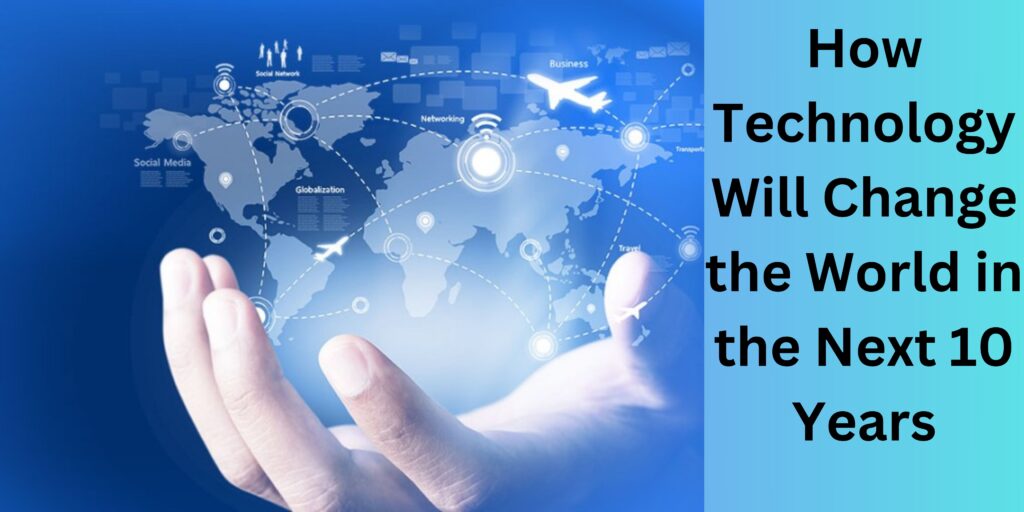Introduction
Hi there !Technology is changing quickly, influencing our lives in many ways. From AI to space travel, the next decade will bring innovations that transform industries and personal experiences. These changes will affect education, healthcare, communication, transportation, and our daily routines. This article looks at how technology will impact the world in the next ten years.

Artificial Intelligence and Automation
AI is already changing many industries, and its growth will continue fast. AI systems will enhance decision-making, automate simple tasks, and improve customer service. Businesses will use AI to optimize operations, while individuals will enjoy personalized AI solutions in education, health, and finance.
AI automation will also affect jobs. Some traditional roles may disappear, but new jobs will emerge that need human creativity. Governments and organizations must reskill workers to meet these changes.
Read more:
The Evolution of Smart Homes
Homes will get smarter thanks to the Internet of Things (IoT). AI assistants will connect with devices to automate tasks like climate control and security. Energy-efficient smart homes will lower carbon footprints and help fight climate change.
IoT will improve home security as well. Smart cameras and real-time monitoring will make homes safer. Personalized AI will adapt to individual preferences, adding convenience to daily life.
Transforming Healthcare with Technology
Healthcare will see major improvements, making treatments more effective and accessible. Telemedicine will become standard, letting patients consult doctors remotely. AI diagnostics will enable early disease detection, boosting survival rates for illnesses like cancer.
Wearable devices will track vital signs in real time, warning users of health issues. Robotic surgeries will become more precise, cutting recovery times and risks. Gene editing technologies like CRISPR will open new paths for treating genetic disorders.
Revolutionizing Transportation
The future of transport will focus on self-driving vehicles, hyperloop systems, and sustainable options. Self-driving cars will reduce accidents caused by human errors. Electric and hydrogen-powered vehicles will become common, cutting down fossil fuel use and pollution.
Hyperloop travel will make long-distance commutes faster and more efficient. Urban areas will see flying taxis and drone deliveries, improving transportation networks.
The Role of Blockchain in Finance and Security
Blockchain technology will change financial systems by boosting security and transparency. Cryptocurrencies will gain acceptance, leading to decentralized finance. Smart contracts will automate agreements, cutting down paperwork and fraud.
Besides finance, blockchain will secure personal data, digital identities, and voting systems. Governments and businesses will use blockchain to enhance cybersecurity and prevent data breaches.
The Rise of Quantum Computing
Quantum computing will break through traditional limits, solving complex problems faster than ever. It will transform industries like pharmaceuticals and cybersecurity. Quantum encryption will secure data transmission, shielding against cyber threats.
Businesses will use quantum computing for quicker data analysis and advanced AI training. Although still early, quantum technology will become more available in the next decade, changing research and development.
Space Exploration and Colonization
The next ten years will bring significant progress in space exploration. Space agencies and private firms will push for Mars colonization, asteroid mining, and space tourism. Commercial space travel will let civilians explore beyond Earth.
Satellite technology will enhance global communication and disaster management. With reusable rockets and ambitious missions, space exploration will challenge human limits.
Advancements in Education
Education will undergo a digital transformation, making learning interactive and personalized. AI tutors will offer tailored learning experiences based on student needs. Virtual Reality (VR) and Augmented Reality (AR) will make learning immersive, allowing students to explore historical events and scientific concepts virtually.
Remote learning will improve, helping students in isolated areas. Blockchain credentials will prevent fraud, ensuring credibility in educational achievements.
Environmental Sustainability through Technology
Technology will help tackle environmental issues. Renewable energy sources like solar and wind will become more efficient. AI climate models will help predict and address climate change effects.
Smart grids will optimize energy use, cutting waste and carbon footprints. Vertical farming and lab-grown meat will transform agriculture, reducing deforestation and ensuring food security.
FAQs
How will AI impact jobs in the next 10 years?
AI will automate repetitive tasks, leading to job displacement in some sectors. However, it will also create new job opportunities in AI development, data analysis, and other emerging fields.
Will smart homes become a necessity?
As technology advances, smart homes will become more common due to their convenience, security, and energy efficiency. However, affordability and accessibility will determine their adoption rate.
How will healthcare improve with technology?
Telemedicine, AI diagnostics, wearable health devices, and robotic surgeries will enhance healthcare accessibility, efficiency, and precision in medical treatments.
Is blockchain only useful for cryptocurrencies?
No, blockchain has applications beyond cryptocurrencies, including secure data storage, digital identity verification, and fraud prevention in various industries.
Ethical Considerations and Challenges
As technology progresses, ethical concerns will arise about data privacy, AI bias, and job automation. Governments and organizations must create regulations for responsible AI development and protect users from data breaches.
Cybersecurity will remain critical, as more digital connections create new vulnerabilities. Ethical AI frameworks will be essential to prevent discrimination in automated systems.
Conclusion
In the next decade, rapid technological advancements will reshape industries and daily life. From AI automation to space exploration, the future holds great potential. However, we must embrace these changes responsibly to ensure technology benefits everyone. By balancing innovation with ethical considerations, we can create a smarter, safer, and more sustainable world for future generations.